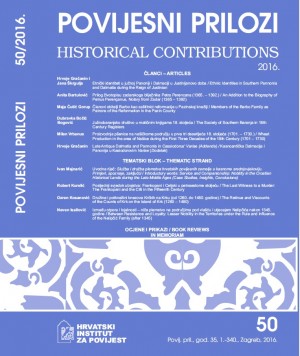The Upbringing of Competent and Patriotic Officers: Military Education at the Theresian Military Academy in Wiener Neustadt (1752-1805)
The Upbringing of Competent and Patriotic Officers: Military Education at the Theresian Military Academy in Wiener Neustadt (1752-1805)
Author(s): Teodora Shek BrnardićSubject(s): Education, Military history, History of Education, 18th Century, 19th Century
Published by: Hrvatski institut za povijest
Keywords: military academy; officer education; Wiener Neustadt; noble academy; Franz Joseph Kinsky; Austrian patriotism; Enlightenment; Habsburg army;
Summary/Abstract: The Noble Military Academy at Wiener Neustadt was opened in 1752 at state expense, and the aim of the Habsburg authorities was to make it a counterpart of the Theresianum Knight Academy (founded in 1746 under the Jesuit administration). Young noblemen were trained there for work in civil service, while the academy at Wiener Neustadt was intended for officer education. Maria Theresa secured scholarships for ca. four hundred cadets from poorer noble families, as well as for sons of deserving senior officers. Boys under the age of 14 attended the so-called Preparatory Military School in Vienna before being admitted at the Wiener Neustadt Noble Military Academy. Both institutions were merged in 1769 into one Imperial and Royal Theresian Military Academy. Teachers, who were at first only secular, that is, coming from the officer class, continued the tradition of humanist and baroque knight academies and the adoption of “knightly skills and military virtues,” aimed at the acquisition of physical readiness rather than the contemporary knowledge of warfare needed to professionalize the army. This paper presents the reforms and changes that took place at the Theresian Military Academy during the reign of Maria Theresa and Joseph II with the intention of modernizing officer education and developing the supra-national “Austrian patriotism” based on the Enlightenment principles as the main foundation of the future officers’ loyalty. These efforts culminated during the command of the enlightened pedagogical writer, the Austrian general and Bohemian aristocrat, Count Franz Joseph Kinsky (1779-1755), whose educational concepts and actions are here extensively presented.
Journal: Povijesni prilozi
- Issue Year: 2017
- Issue No: 53
- Page Range: 109-132
- Page Count: 24
- Language: English

